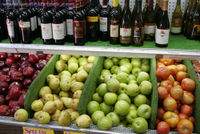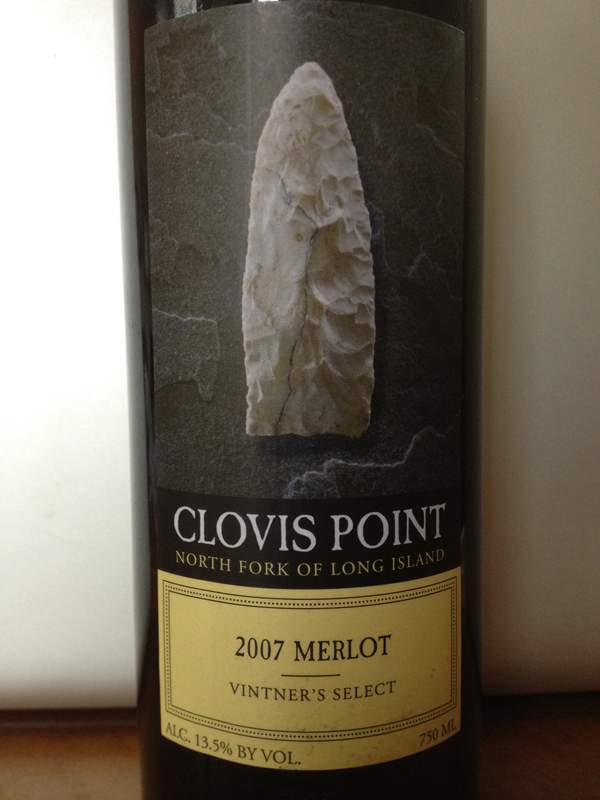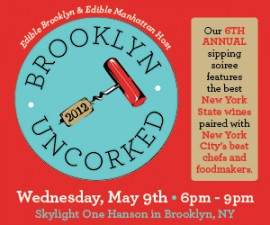Wine In Grocery Stores: Coercion? Boycotts? Intimidation?
By Evan Dawson, Finger Lakes Correspondent

The issue has become so heated, so emotional, that some wineries feel threatened. Liquor stores are predicting widespread closures and job losses if the bill passes. And while New York wineries figured this was not their war to wage, they increasingly find themselves dragged into the debate. What's going on?
Is everyone playing fair?
There is no doubt that wineries feel threatened by liquor stores. After speaking to 15 winemakers and winery owners in the Finger Lakes, only two agreed to speak to me on the record. All said they've felt pressure from angry liquor store owners to support the liquor stores vs. grocery stores. Six told me they were surveyed by phone for an official position on the issue, with the warning that the "wrong position" could result in a boycott of their wines among liquor store owners.
Fox Run Vineyards owner Scott Osborn testified in Albany last week in support of the bill. Since his testimony, Fox Run has been flooded with angry phone calls and emails, like this one from Frank Salamone of Hoosick Street Wine in Troy:
I saw you on the news yesterday. Thanks for trying to put me out of business. I used to like pushing your wines but now just looking at them makes me want to puke. I'll never sell any of your wines ever again! When we beat this proposal I hope it's you that goes under.
"It's unfortunate, and it's been hard," Osborn said, noting that Hoosick Street has not carried Fox Run wines for at least the past year. "I want a solution that will allow liquor stores to thrive, and I think they still can. We've had great relationships with stores around the state, and we're committed to helping them in any way we can. Having our wine in grocery stores does not mean we want other stores to fail." The new law would not allow grocery stores to host tasting events, and Osborn said that Fox Run will continue to hold regular tasting events in liquor stores. "They provide a great service to customers, and it's in all our of interests to see that continue."
There is a difference, however, between pressure and illegal coercion, and some winery owners are wondering if the Attorney General's office will investigate the behavior of some liquor stores. That's because Doug Miles, owner of Miles Wine Cellars on Seneca Lake, released an email he received last week from a liquor store owner in the Rochester area. It came from Jim Lepore, owner of Chili Liquor in Chili, NY. After Miles testified in Albany in favor of selling wine in grocery stores, Lepore wrote to Miles
The liquor store association is going to list on their Web site all the wineries that are on our side. I feel sorry for those that are not. Most stores are not going to support those not on our list.
"I took that as a very clear threat," Miles told me today. "And the threat has already materialized. We work with 77 liquor stores in this state. Several have already called me to tell me they are pulling my wine off their shelves. Others are declining to order more. I've even gotten calls from liquor store owners who never carried my wine, and they call to warn me to change my position or they'll never carry it in the future."
I spoke to Lepore today, who said the email was a big misunderstanding. "It was absolutely not a threat," Lepore said, explaining that the disputed part of the email was just a small part of a long back-and-forth with Miles. "I still carry his wine. I will continue to carry his wine. The reason I wrote what I wrote was because I wanted to help him, as a small business owner, see what might happen in other stores. But that doesn't mean I want people to boycott his business."
Lepore said that since his email to Miles was released to the public, liquor stores owners from across the state have been calling. "I tell them to carry what sells," Lepore said. "You have to take care of your customers first. But I can't control what other store owners do, because we're all independent. Are they going to drop Miles? Some will. Are they going to carry new Miles wine? Some of them won't. But I don't think anyone is coercing anyone. You have the right to carry what you want to carry. I'll carry Miles and 400 other New York wines because that's what sells and that's what I believe in."
Miles told me he's already heard from customers who can't find his wines where they are normally carried. "We want customers to call us or email us directly if they can't find our wines anymore, and we'll ship directly to them. We'll provide free shipping. We want people to have access to our wines."
Miles said that if liquor stores coordinate a boycott, "They could hurt wineries very badly. I don't deny that. But I'm just surprised at this reaction. I don't want to hurt liquor stores. I think liquor stores deserve more rights to sell other products if grocery stores get wine. I strongly support liquor stores in getting more opportunities to sell."
But Jim McKenzie of the New York Liquor Stores Association told me that's not what liquor stores want. "We want the system kept the same," he said. "We're going to lose a thousand liquor stores if this goes through. We don't want to negotiate for other things." McKenzie also denied that there is a coordinated effort to boycott New York wineries that don't support his side. "We don't want to make enemies with anyone. There might be an owner here and there who decides to pull certain products, but that's uncontrollable. There might be store owners who feel like they're getting screwed, for lack of better term, and maybe they don't know how to respond. But we are certainly not encouraging (a boycott)."
At risk are not just the liquor stores, McKenzie says, but small wineries likes Miles.
"Small wineries grow by eventually getting their products in liquor stores. Their wines are sold by knowledgeable people who specialize in wine. Customers hear their stories and learn about who they are and what they do. If grocery stores get wine, small wineries will suffer."
Miles appreciates the sentiment, but he points out that only 3% of liquor stores in the state carry his wines, and of those 77 stores, "Maybe about a dozen are actively selling our wines. We appreciate it so much. Our relationships with liquor stores is important. But it's still a very, very small number of liquor stores that are showing interest in small wineries like us."
And yet most smaller Finger Lakes wineries are either neutral or in support of the liquor stores. Bob Madill of Sheldrake Point thinks liquor stores need to prepare for the bill's passage. "I'm very concerned about liquor stores closing," he said. "But 35 states sell wine in grocery stores. I think it's going to happen here. And if it's going to happen, we need to work with stores to make sure we're preserving jobs and maintaining the outstanding work that they do for customers. We can't be making enemies — this is an important time to work together."
Note: We know that this is only a part of the governor's proposal, this isn't meant to be a comprehensive story.














It’s amazing that the focus is on wineries being threatened when in fact it is the liquor stores that are under attack and being threatened. Supermarkets and Bob Box stores that will feature wonderful wines like Yellow Tail are trying to put these stores out of business. And they are making crazy promises — bribes some who call it — to wineries of wonderful exposure. It’s a crock and many, many wineries know it. New York wineries have grown and flourished over the last 20 years in this system and there is simply no credible evidence wine drinking will increase if it changes. There has also been no discuss about the impact on underage drinking in this post. The State set up a system to control the sale of wine and liquor — which have much higher alcohol content than beer — for a reason. Remember, its not just grocery stores but every corner store and gas station that sells beer could sell wine. That’s why law enforcement is overwhelmingly against this plan.
In Syracuse, which has a flagship Wegmans store (it was just expanded, so it might be the biggest overall right now) plus at least five other Wegmans of a good size, I can see this law putting at least 3-5 liquor stores out of business immediately. Over time, several more might go under. A solid few, which have carved out a niche, will remain in one form or another.
I’m a bit torn on this issue. While I don’t prescribe to the notion that the state should have mandated in the past that any good or service should be separated from general stores, the fact remains that the state has supported the formation of two different industries for the past 40 years (really, the SUPER market as we know it has only been around about that long).
Let’s examine the main goal here: the state will structure this change in a way to get more money. I think this goal is short-sighted in that many of the thousands of liquor stores are long-time anchors in various shopping areas, strip malls, etc. The sudden disappearance of a good amount of these stores will cause an economic wrinkle that will negatively affect commercial property owners and neighboring tenants. Overall, I would not be shocked that within a five year span, or maybe longer, the reduction in tax revenue will result in a break-even proposition for the state despite the increased revenue from grocery store wine sales.
Consider the plight of the video store, which was inevitable due to changing technologies. We have only begun to see the stains of their quick downfall dry up in many locations. Think about what happened to various shopping areas when these stores suddenly closed their doors in the late ’90s, early 2000′s. These transitions, whether for good or bad, have both benefits and costs!
Unfortunately, New York state government rarely considers true analysis. Their goals are short-term, political, and often clouded with lobbying.
While I believe wholeheartedly in as few restrictions as possible in any way, shape, or form, I am frustrated and disappointed by New York. The way this state has wormed its way into every facet of life gives lawmakers way too much power to make or break entire industries with the simple passage of a bill. Ideally, consumer behavior over time should have shaped how we buy and consume wine. Instead, we are forced to wrangle over this one bill, and feeling will be hurt and lives will be altered forever. No matter the outcome, we automatically acquiesce to the power of lawmakers over our economic existence. Frankly, that scenario stinks, and it’s the same theme that continues to strangle the New York economy and drive businesses and people away.
I must, reluctantly, throw my hat in the ring for simply permitting wine to be sold anywhere and everywhere, but I don’t think this bill will take that shape. This bill not be a general notice of release. It will be specific and it will retain power for the state in some fashion. Most importantly, it will be concerned with increased tax revenue, the lifeblood that those hungry leeches in Albany can’t seem to live without.
For a state that seems to proclaim itself as liberal, open-minded, and progressive, the government cannot help but hold our little hands as it guides us to the mandated, proper way to consumer alcohol, and then it wants to pick our pockets for the service. I am looking forward to wine being found in more places, but I cannot help but think that the more things change, the more they stay the same.
Mike,
Don’t mistake this post for a comprehensive look at the issue. The point was to focus on one angle, which is the animus that has developed between some stores and wineries. I don’t claim it to be the only issue that matters, but it’s significant nonetheless.
I think it’s inevitable that some liquor stores will close if this bill passes. Will we see the closure of 1,000 stores, as the lobby suggests? We might. I certainly hope not. I can not imagine myself buying wine in a grocery store, and I value the outstanding service and knowledge that liquor stores provide.
As a Libertarian, it’s hard for me to oppose anything that allows consumers more options and freedom. Just because the result — poorer selection and the possible closures of stores I favor — is inconvenient to me, and potentially injurious to my wallet, doesn’t mean I should compromise my values.
That said, I can’t support the bill as it currently is proposed. That’s because the state has intervened to support two separate economic branches — grocery stores and liquor stores — and this intervention by the state is picking one winner and one loser. The state ought not pick winners in losers in industry. This bill is simply unreasonable if it does not also extend new rights of sale to liquor stores. I understand that the liquor store lobby is not interested in bargaining for the right to sell beer, or food, or other items, but that’s the only way to make this deal fair.
And regarding more underage drinking, it’s not news that kids break the law. The state’s job is not to be a nanny; Richard and I had a long discussion about this issue in a previous thread. I don’t want to see an increase in underage drinking and driving, but if that’s your rationale for blocking legislation, it’s a slippery slope. After all, some kids use fake IDs to buy alcohol in liquor stores. If we shut down all liquor stores, well, we’d see a decrease in drinking and driving, right?
The bottom line is that the state can’t insist this is fair as currently constructed. Concessions simply must be made to liquor stores.
And I wonder what would happen if the state allowed only NY wine to be sold in grocery stores. Who would benefit? Who would suffer?
Mike: You are right. The “wine in grocery stores” is not just a winery issue. It will inevitably mean that many wine shops, run by hard working, honest people, will fight to survive.
I don’t place any trust in grocery stores to stock NY wines. Why would they? What’s in it for them? Look at the produce they stock. It’s from California, Mexico, Chile….not from Long Island — even in the summer months when local produce is widely available and tastes better. Why don’t they stock it? Price and existing contracts.
Most grocery stores who do make the move to sell wine, will just sign on with large distributors who will basically make their selections for them, based on price point.
If local wineries want to get into these grocery stores, are they going to need to drop their price so far that they make pennies per bottle? Maybe. And if that’s the case, why bother?
Growing up in PA (which has an even more strict system than NY) and now living here, I’ve only experienced wine in grocery stores on vacation and while convenient, the selection is rarely interesting. Good, well-stocked wine shops will always be my destination.
It’s stupid to think that wine being available in grocery stores is going to increase overall wine consumption and make more money for the state.
As to the under-age drinking issue, that is often just a pawn used by differing sides of alcohol-related issues, and I think it waters down the real argument. Unfortunately, teens can already get their hands on alcohol if they really want to. Is there any evidence that this new availability will increase underage drinking? Has it happened in other states in an quantifiable way?
This commenting is rambling, but there are just so many issues at play here. At the end of the day, as a lover of NY wine, I want the wineries to succeed, then wine shops, then grocery stores.
And let’s not forget that the grocery store issue is only a small sliver of Gov. Paterson’s proposal. It’s the most consumer-focused one, so it gets all of the press, but it’s by no means the most important one. The proposed increase in excise tax is (in my opinion).
There is no doubt that this law helps grocery stores and large volume, high discount wine producers (from New York, maybe, but much more so California, Chile, etc.). Few, if any, New York State wineries will benefit from this new legislation. Grocery stores will fill their shelves with inexpensive brands and box wines. It will indeed throw the liquor industry into a tail spin. Perhaps it is evolution.
But I think it is not.
The real fact of the matter is that Albany and Governor Patterson are acting in their own best interests. The state, in the long run, will not earn one more red cent from liquor sales taxes. Because wines are suddenly available in grocery stores, does not mean sales will go up.
The truth is that Albany is interested in the windfall. The state will collect hundreds of millions of dollars in windfall from licenses and fees from all the grocery stores. These are a one time profit. The state doesn’t particularly care that they are putting out of business people who have already paid for licenses like existing wholesalers and liquor stores.
Patterson and the other legislators in Albany will parade around their ill-gotten gains touting their ingenuity, which in truth will not be gold, but will be the scalps of liquor store owners whove gone out of business, many of whom have supported NY state wine.
Massachusetts faced a similar issue a couple years ago when a ballot measure came forward to allow grocery stores to sell wine. Though a very few grocery stores had been previously permitted to do so before, the ballot measure would have permitted all such grocery stores to do so.
This ballot was defeated, and in hind sight, it appears one of the most effective advocates against the measure was the police. They offered some research figures to indicate that in states where wine is readily available in grocery stores, there is a noticeable increase in the number of alcohol related auto accidents. The scary police commercials about this issue, were persuasive to the general public.
First, for the record, this issue is a line item in Governor Paterson’s budget proposal - it is presently not constructed as a bill, however there are discussions to create one.
Its not just the grocery store issue that is in play here; I’m seeing this issue as just one third of a larger proposal that includes tripling of wine excise taxes and the complete removal of funding for the NYSWGF. Taken as a whole at face value, this proposal includes nothing positive for NY producers. Now there are many opinions on the NYSWGF out there but I will tell you the most important thing they do in my opinion, is act as a state broker for grant monies that fund not only market initiatives but also a tremendous amount of research in NYS - much of it in affiliation with Cornell University - both at the University and at the Extension Level. Cutting these funds would be devastating for the long term health of the industry. It would affect all grape and wine research in NYS, including the work currently being done on Long Island.
Tripling of state excise taxes speaks for itself…it puts the tax burden on the producers while at the same time eliminating our state-wide trade organization sending all the additional revenue into the general state coffers to help them balance the budget.
With respect to the grocery store issue, there might be a few stores that decide to carry us but I’m not optimistic. All you have to do is look at the track record for other types of produce. My main issue is this - I’ve been working with stores for over 20 years who have supported LI (and NY) wines from the beginning. They carried our products and introduced many people to LI wine. Now their livelihood is being jeopardized and I think we need to support them. As the old saying goes: “You dance with whom you brought to the dance.” I don’t think the timing of this nor the approach is correct and frankly I trust the people I’ve developed relationships with and sold to over the years - not a faceless, giant corporation who will probably take advantage of the many hundreds of inexpensive, low-quality, mass produced wine brands - from CA and elsewhere - to stock their shelves. If it does happen, I’d be surprised to see a lot of LI wines there. That’s just my opinion. I think the issue can be viewed in a different context in upstate NY - where the demographics, population density and geography of the area are different.
I hope the proposal is removed from the budget and they go after some other ways to raise revenue namely eliminating waste, prosecuting tax cheats and making the individuals and corporations who should be paying their fair share start writing out checks.
Lenn,
You’re nuts if you think more people won’t drink wine if this passes. They’ll drink mass-produced, homogenous wine, but certainly more people will drink wine. Most people don’t shop in liquor stores. As a result, their alcohol options are limited and they drink a lot of beer. You don’t think at least some percentage will ocassionally opt for wine instead of beer? It’s been proven to be true in other states.
Most of it won’t be local, of course. We’d be ushering in a revolution of boring, big brand wine.
“its been proven to be true in other states.” well lets see this proof. And no, I highly doube the average shopper is going to start buying wine just because its now on the super market shelf. Supprising as it may seem to our small, navel-gazing community, BUT MOST PEOPLE DONT LIKE WINE.
Rowland,
Most people don’t have to like wine. It only takes a small percentage of shoppers to occasionally buy a bottle of wine instead of beer for the number of wine drinkers to go up. I’m not saying I like the way it’s happening, but it’s simple logic and producing numbers to support it would be easy to do.
I think we’re overlooking the positive impact that wine in grocery stores will have on wine culture in this state. I read a statistic recently that stated 80% of shoppers NEVER set foot in a liquor store. Just having wine out in the open, next to the pickles and beans in the grocery store, is going to have a huge impact. People who may not have ever ventured into a liquor store are going to be exploring wine. Having lived in California, Oregon, and Washington- three states where wine is sold in grocery stores- I’ve seen first hand that many people in these states view wine as a ubiquitous part of life. It’s a product with a value that’s understood by the masses. I think despite our culture and diversity here in New York the public here still sees wine as a luxury and has a difficult time understanding it. It’s time for this to change.
Having sold ultra premium Oregon wine to grocery stores in the Northwest I can say first hand that I wasn’t dealing with a big corporate machine, but selling to wine specialists in each individual store. Maybe I’m idealizing and maybe the Gallos and Mondavi’s of the world do it differently, but there WAS room for the little guy, even the expensive little guy, on the grocery store shelves of the Northwest.
As for the argument about opening up opportunities for underage drinking, I see that as a paranoid scare tactic that the liquor stores are using. Underage drinkers are going to stick to the Boone’s Farm and cheap beer that’s already sold in every corner gas station. When you have a budget of $5 and are drinking to get drunk, you’re probably not going to buy a bottle of Chardonnay. Besides…liquor will not be sold at grocery stores, just wine. You will still need to buy liquor at a “special” store.
This is an argument that has been going for such a long time. I think that Paterson just brought it to the forefront recently. Here’s my paltry two cents. Until last June, my husband and I owned a very small wine shop in Westchester County, here in NY. (Incidentally we sold it not because the business wasn’t doing well — in fact it was — but for personal reasons.) The way we looked at this issue was — go ahead and let the supermarkets do it! Why? Because they’d probably be selling stuff like Yellow Tail, Turning Leaf, mass-market stuff (as everyone has duly noted). As a small shop, it was impossible for us to make a profit off of those types of wines anyway. (We did not have the space to store 20+ cases). We carried a bit of it (mostly in mag sizes) as a courtesy to a couple very loyal customers, but these types of wines certainly weren’t our bread & butter. They didn’t make us much money and, in fact, were often more trouble than they were worth. The markup on 3-5 case buys sucked and God forbid you price them accordingly. The sales reps would scold you and request that you price them the same as the big liquor barns. (Which we didn’t do. We were not about to lose money selling wines we didn’t absolutely love in the first place).
If these wines were sold in supermarkets, it would have given us the freedom to totally focus on small-production wines like we wanted to. The majority of our inventory was made up of smaller production wines (many 1-2 case buys) that bigger stores didn’t want to bother with. That was the stuff we made money on. I just don’t see large grocery store chains stocking wines that most people are not familiar with. Who is going answer people’s questions? A 16-year-old stock boy? I think that the liquor stores that would be most hurt are the bigger ones that sell cases and cases of Cavit and Stimson. And I feel for them, I really do, but maybe it’s time for some of these guys to adapt. Smaller boutique-type stores might actually benefit in the long run. It just will take some creative thinking and getting customers off of big brand names (which isn’t all that hard to do if they trust you). But that’s work and let’s face it, in this business a lot of liquor store owners just don’t want to have to hand-sell.
One other point is that currently, in New York State, it is against the law to buy as a group. Each individual grocery store would need an individual license. So what? Well, that would make it unattractive for them to purchase and sell high-end wines. I guess if, say, Stop & Shop could get one license for all their NY stores and then do a mass buy on Silver Oak, that would hurt a lot of liquor stores large & small. But as the licensing now stands, each individual store would be responsible for their own inventory and I doubt they would want a case of Silver Oak or some esoteric Bordeaux hanging around for the one guy a year who’s going to buy it. Does anyone know if there is a suggestion that licensing will change and stores can buy together as a group? Because *that* would totally change the dynamic of the wine & liquor business here.
As for underage drinking, well, considering that grocery stores here already sell beer and malt beverage products (wine coolers, etc.), I don’t think that selling wine would prove to be any riskier.
Now, as simply a wine consumer, I could certainly see myself picking up a bottle of wine when I buy my groceries because it happens to be convenient at the time, but not regularly. There is just no way a supermarket is going to offer the selection of a wine shop. I think they’d pick a selection of core brands and leave it at that. People who drink wine regularly are still going to want to be trying new things. And if selling the cheap stuff in supermarkets gets more people drinking wine, isn’t that a good thing? Eventually they’re going to want to move on and try more exciting wines (that probably won’t be sold at grocery stores).
I just don’t see this as a bad thing, necessarily. There’s no doubt it will hurt some businesses, but I can see where it could potentially put more money in the pockets of wine store owners who are willing to put forth the effort.
Evan: Would love to see this evidence from other states. Prove me wrong, my friend.
On this part of Long Island, almost every grocery store plaza has a liquor store in it. MOST of the liquor stores focus on the kinds of wine the grocery stores will have. The access is right there. I know that Americans can be lazy, but that lazy not to go down the strip mall 2 doors?
If they have never been in a liquor store as mentioned above, they must not like wine (although I guess maybe they haven’t been exposed to it?).
Even if people buy less beer and more wine, does this really help the state’s fundraiser? Not sure what the tax-per-buzz ratio is. Obviously you need less wine to get drunk, which is what many people are looking for, right?
Carol,
Wonderful post. I share your enthusiasm that stores might find ways to adapt and still thrive.
Do you think liquor stores ought to bargain for the right to sell a wider range of food and beverages?
Lenn,
Sigh, I’ll track down some numbers for you. But you’re ignoring plain logic here. Your argument is that all wine sold in grocery stores would be to customers who otherwise would buy wine in liquor stores. All of it? Seriously? Of COURSE some people are lazy enough not to go down the block. Of COURSE some people who would not go into the liquor store would buy wine in a grocery store.
Here’s what I’m missing: How can the state of New York, which has propped up and coddled both the grocery lobby and the liquor store lobby for decades, switch gears and choose winners and losers? How can the state not make some concessions to liquor stores?
Lenn,
I tried to post earlier; it might be hanging in the ether. Let me address your question about wine drinkers.
Let’s assume there are X wine drinkers in NY state right now. They buy all of their wine outside of the grocery store. Therefore, anyone who only buys alcohol in grocery stores is not a wine drinker and is not included in X.
Now let’s assume the state allows grocery stores to sell wine. Let’s also assume that grocery stores will sell thousands of bottles of wine. We have a new variable, and that’s Y, which represents the grocery shoppers who now purchase at least some wine now that it’s available in grocery stores.
The only way that we would NOT see more wine drinkers is if Y = Zero. This would mean that every single person who buys wine in grocery stores would otherwise buy wine in liquor stores. And the only way this would work is if not one single grocery shopper decided, “Hey, wine’s available here, why not?”
I don’t think you believe this is possible. Obviously we’ll end up with more wine drinkers in this state. It is statistically inevitable.
So there are two questions. What is the value of Y (unknowable, other than the fact that is not possibly Zero), and what kinds of wines will they drink? I’m more concerned with the second question, and I think you should be, too.
Lenn - excellent post - I definitely agree with you about looking for other places that this has worked.
Big Al - I grew up in the Northwest - Oregon has fairly restrictive liquor laws similar to Pennsylvania except wine and beer are excluded. Your typical liquor store is small and state licensed and stocks only a small amount of wine. Supermarkets are considered the place to buy wine and have been for a while. But it’s a much smaller market - less than a fifth the size of NY. I just can’t see Pathmark and D’Agustinos and Food Emporium doing a decent job in the wine biz.
The situation here in the UK - where supermarkets completely dominate the wine trade - should be seen as a warning. It’s not just big brands dominating. The real problem are the exclusive brands that are usually substandard as well as poor value but defie comparison. Think the Trader Joe’s model but on a wide scale.
The tough regulations in New York have accidentally made it one of the best places for the wine consumer in the world - it will be a shame to lose a wonderful thing.
An example of a good use of regulations is the NFL - they are highly regulated (and strangely quasi-socialist) to level the playing field between teams. In the end, the fans benefit since the leagues aren’t dominated by a small group of teams.
I’m usually for less restrictions on business, but this one is definitely in favor of large retailers at the expense of consumers.
Evan: I think it really depends on the store. I can see where selling gourmet foods or possibly beer would be attractive to some shops, but I don’t know what the mark-ups are like on those items so it’s hard for me to comment.
Evan: I guess my argument would be that okay, Y isn’t zero. But it is a significant number?
Using K-J chard as our “grocery store wine” because it’s both popular and made in huge quantities, let’s look at it this way:
Out of the people who buy their wine at wine shops (me and you included) there is a percentage who will never stop doing that (again, probably me and you). There is another group that, if given the choice to buy K-J chard at the grocery store instead of the wine shop, will do so and no longer go to the wine shop.
What you bring up is a 3rd group that we have no idea about in terms of size or buying power. This is a group that doesn’t buy wine now, but will if it’s next to the beer or Doritos. I’ll concede that there will always be a small group that might…but how significant is it? Is it enough to really affect the state’s bottom line? Doubtul. BUT, it losing the K-J fans to the grocery store WILL hurt the wine shops bottom line (at least at first).
I mean, I don’t smoke, but if cigarettes were suddenly available next to the peanut butter, would I impulse buy? No, I wouldn’t.
Steve,
Regarding your last point: I agree that less restrictions on business is usually best, and I agree that in this case, consumers will not benefit because they’ll be drinking poorer wines and the selection will suffer.
But here’s the problem: Most consumers would probably not agree with that statement. Most consumers wouldn’t realize there is much better wine — even much better wine for very good value — that could be had under different circumstances. They’d be happy enough to get their wine more conveniently.
In theory, the free market would handle this in one of two ways:
1) Dissatisfied consumers purchase less wine or lobby stores to increase selection
2) Consumers are satisfied enough not to change behavior nor complain.
So is this a case where the market is actually inefficient in presenting the best option for consumers? Is continuing strict regulations a better option? I think it’s strangely possible.
Lenn,
I think there are results that are not mutually exclusive.
1) The number of “new” wine drinkers is fairly significant. This is such a nebulous term, but we’re talking thousands of people. Who the heck knows, but it’s a nice little bump.
2) Even with the new wine drinkers, the state won’t be collecting very much money. Not relative to state budgetary problems, anyway. I understand that NY state is trying to the fix the dam cracks with a hundred small pieces of bubblegum, but this is silly. The new tax revenue is tiny in the big picture, and the state ought to stop touting its impact.
See, I think you and I agree on just about everything here.
Evan
Lenn may be nuts…about NY wine that is, lol.
All in all it just seems like this is legislation to benefit the state, not its people.
A good proposal?
Hmm, shortsighted. To create revenue for NYS Paterson proposes a bill that will surely close hundreds if not thousands of small stores throughout the state. It will cost the state money in the long run through unemployment, lost income tax, real estate tax and emptied retail space. And new staff hiring at grocery chains will be minimal and circumscribed to a few buyers at headquarters.
It will close our last healthy mom-and-pop business, just like it did with the bakeries, the florists and the butchers. All so grocery stores can add one more aisle of merchandise to the zillion other items they already sell.
They’ll carry wines ‘manufactured’ with tons of fertilizer and gallons of insectisides that find their way in the finished product and in large industrial volume like Yellow Tail, Gallo and the likes.
Forget about informed service and unusual artisan wines at grocery stores. They pay low wages and make profit on volume and speed, service and non-industrial products are just not in the cards!
And what will your downtown look like? In the best of the world, a string of Starbucks, Amercian Apparel and McDonald’s so everyone can drink the same brown beverage, wear the same adolescent clothing and eat the same garbage. Isn’t that socialism?
Just so you can save a buck on your bottle of Yellow Tail?
Socialism?
I think you’ve been drinking too much Yellow Tail…
I am a new LI wine producer (Bouké) and I am opposed to wine sales in grocery stores because it will weaken my customer base, the NYS wine and liquor shops that carry and recommend local artisinal wines.
Coming late to this conversation after weaving through a team of people at Wegmans who were getting signatures in support of this measure…
After living in California and New Jersey I’m hard pressed to see the difficulty here-I’ve read the issues on both sides-I’m just saying that as a consumer, having more choice was a good thing.
I dream that we might be like California (it’s a long shot, I know) where supermarket aisles (form Safeway to Whole Foods) are stocked with wines from that state-wouldn’t it be great if supermarket aisles had a large selection of NY wines?
That being said, the supermarket was the place to pick up an every day, last minute bottle-or even a entry to a new label or varietal. I found that accessibility helpful as I first began exploring wine 15 years ago. ‘Supermarket wine’ has its place.
But really, what it did was drive me to the wineries-at least in California. That is where I did the bulk of my wine shopping and NY is lucky enough to have several regions in relative proximity to any part of the state.
Finally, the liquor store was where I went for convenience, broad selection and better pricing (in New Jersey)and boutique labels that I didn’t have to drive up to wine country for (in California). For these smaller boutique wine shops and liquor stores, it was also about the experience (atmosphere and wine tastings) that couldn’t be had in the supermarket.
So from the perspective of the consumer I think this could be a good thing. I can’t speak to the economics of it but when I see liquor stores carrying wine at lower prices than the winery charges it makes me wonder how supermarket pricing will be much different.
I THINK WE SHOULD LEAVE NY ALONE AND FIND OTHER WAYS TO RAISE TAXS. LET’S STOP THE WINES IN GROCERY STORES AND MOVE ON. LEAVE NY ALONE !!